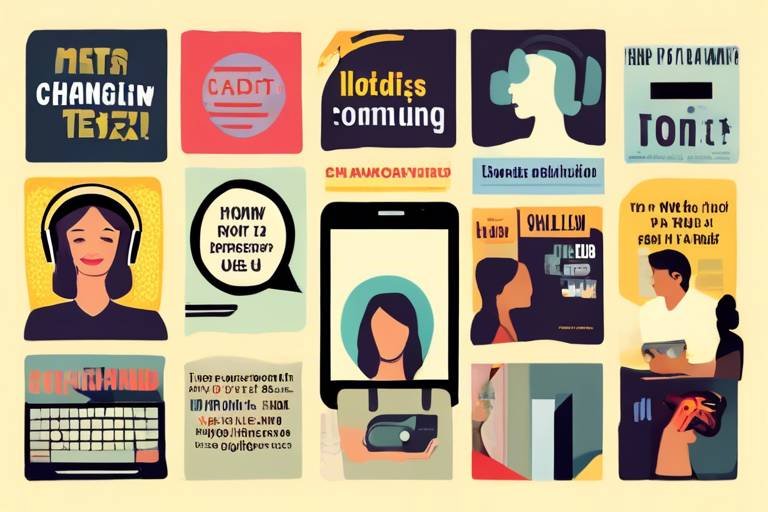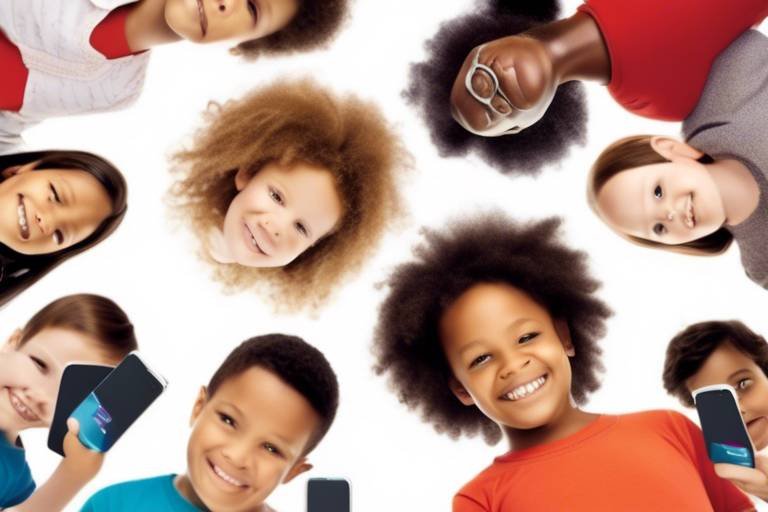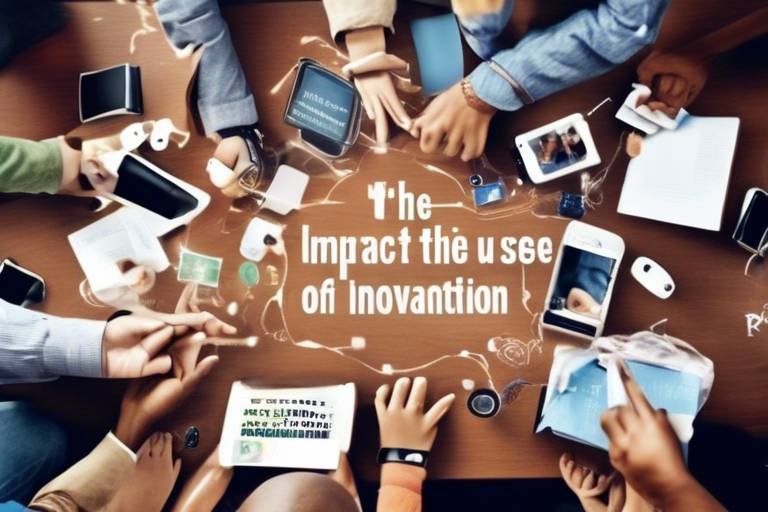How Podcasts are Changing Information Consumption
In today's fast-paced world, where information is just a click away, podcasts have emerged as a revolutionary medium that is reshaping how we consume content. Gone are the days when we relied solely on traditional forms of media like newspapers and television. Instead, we are now tuning in to our favorite shows while commuting, exercising, or even cooking dinner. This shift is not just a trend; it's a significant transformation that reflects our evolving relationship with information. So, what exactly is driving this change?
The podcasting phenomenon has taken off in the past decade, drawing millions of listeners into its auditory embrace. This surge in popularity can be attributed to several key factors. Firstly, the accessibility of podcasts is unparalleled. With just a smartphone and an internet connection, anyone can dive into a world of knowledge and entertainment. Whether you're interested in true crime, history, self-improvement, or niche hobbies, there’s a podcast out there tailored just for you. This vast selection allows listeners to curate their learning experiences in a way that traditional media simply cannot match.
Moreover, the convenience of podcasts is a game-changer. Imagine being able to consume educational content while multitasking—it's like having a personal tutor in your pocket! This flexibility caters to our modern lifestyles, making it easier than ever to learn on the go. Whether you're walking the dog, stuck in traffic, or waiting in line at the grocery store, podcasts turn mundane moments into opportunities for growth and discovery. This shift not only enhances our learning opportunities but also democratizes access to information, allowing diverse audiences to engage with content that resonates with them.
As the podcasting landscape continues to evolve, it is becoming increasingly diverse. Creators are tapping into niche markets, fostering communities around shared passions and specialized knowledge. For example, you might find podcasts dedicated solely to organic gardening, vintage toy collecting, or even obscure historical events. This targeted approach not only attracts dedicated listeners but also cultivates a sense of belonging among audience members. People are no longer passive consumers of information; they are active participants in conversations that matter to them.
One of the most compelling aspects of podcasts is the personal connection they foster between hosts and listeners. Unlike traditional media, where the audience is often a faceless entity, podcasts create an intimate atmosphere. Listeners feel as if they are part of a conversation, which can significantly enhance information retention. Think of it this way: listening to a podcast is like sitting down with a friend who has a wealth of knowledge to share. This personal touch builds loyalty among audiences, encouraging them to return for more episodes and engage with the content on a deeper level.
The impact of podcasting is not just limited to individual listeners; it also poses challenges and opportunities for traditional media outlets. As more people turn to podcasts for their news and entertainment, radio, television, and print media are forced to adapt. Some are embracing the podcasting format, creating their own shows to reach audiences where they are. Others face the daunting task of competing with the authenticity and relatability that podcasts offer. The landscape is shifting, and traditional media must innovate to remain relevant.
In the realm of education, podcasts are making waves as a powerful learning tool. Educational podcasts are revolutionizing how we absorb information, providing an alternative to conventional teaching methods. The effectiveness of audio learning is being recognized in formal education settings, where teachers are integrating podcasts into their curricula to enhance student engagement. This shift not only benefits students but also empowers lifelong learners who can access a wealth of knowledge at their fingertips.
As the podcasting industry continues to grow, monetization strategies are evolving as well. Creators are exploring various avenues to sustain their work, from advertising and sponsorships to subscription models. This diversification is shaping the financial landscape of podcasting, enabling creators to produce high-quality content while connecting with their audiences in meaningful ways.
However, despite its growth, podcasting is not without challenges. Podcasters face a competitive landscape, with thousands of shows vying for listeners' attention. Discoverability is a significant hurdle, as many creators struggle to reach their target audience amidst the noise. Additionally, maintaining production quality can be daunting, especially for those just starting out. Navigating these obstacles is crucial for podcasters aiming to succeed in this dynamic environment.
Looking ahead, the future of podcasting appears bright. With continuous innovation and advancements in technology, we can expect even more exciting developments in the world of audio content. From interactive podcasts to enhanced listening experiences through virtual reality, the way we consume information is bound to evolve further. As we embrace this auditory revolution, one thing is clear: podcasts are here to stay, and they will continue to shape how we learn, connect, and engage with the world around us.
- What are podcasts? Podcasts are audio programs available for streaming or download, covering a wide range of topics.
- How can I start listening to podcasts? You can listen to podcasts through various platforms like Spotify, Apple Podcasts, or dedicated podcast apps.
- Are podcasts free to listen to? Most podcasts are free, although some may offer premium content through subscriptions.
- Can I create my own podcast? Absolutely! With the right equipment and content, anyone can start their own podcast.

The Rise of Podcasting
Podcasting has truly experienced a meteoric rise in popularity over the past decade, transforming from a niche hobby into a mainstream medium for information consumption. It’s fascinating to think about how this relatively new form of media has captivated millions and reshaped the way we engage with content. But what exactly has fueled this surge? Let's dive into the factors that have contributed to the podcasting boom.
One of the primary drivers of podcasting's popularity is the **explosion of smartphone usage**. With smartphones now being ubiquitous, people have the world at their fingertips, and podcasts are a perfect fit for this on-the-go lifestyle. Whether you’re commuting, exercising, or doing household chores, podcasts allow you to absorb information without needing to be tied to a screen. Imagine turning your mundane commute into an enlightening journey through the latest science discoveries or historical events! This convenience has made podcasts an attractive option for busy individuals seeking to maximize their time.
Moreover, the **diversity of content** available in the podcasting realm is astounding. From true crime to personal finance, from comedy to self-improvement, there’s something for everyone. This variety not only caters to broad audiences but also allows creators to target niche markets effectively. For example, a podcast focused on sustainable living can attract environmentally conscious listeners who are eager to learn more about eco-friendly practices. This ability to find and connect with specific audiences is a game-changer for content creators and consumers alike.
As we explore the implications of this rise, it’s essential to consider how traditional media has responded. Radio stations have started to produce their own podcasts, and television networks are adapting their content for audio formats. The shift has led to a **blurring of lines** between different media types, and as a result, we see radio shows turning into podcasts and vice versa. This adaptability showcases the resilience of traditional media in the face of a changing landscape.
In addition, the **increased accessibility** of podcast creation tools has empowered anyone with a story to tell. Unlike radio or television, where entry barriers can be high, podcasting allows individuals to create and distribute content with minimal investment. This democratization of content creation means that unique voices and perspectives can emerge, enriching the podcasting ecosystem. It’s akin to opening the floodgates of creativity, where every individual has the potential to contribute to the conversation.
As we look to the future, the rise of podcasting signifies more than just a trend; it represents a cultural shift in how we consume information. With its ability to engage, inform, and entertain, podcasting is not merely a passing fad but a vital component of our digital lives. So, what’s next for this ever-evolving medium? The possibilities are endless, and the journey is just beginning!

Accessibility and Convenience
In today's fast-paced world, the demand for accessibility and convenience has never been higher. Podcasts have risen to the occasion, offering a unique solution for those who want to consume information without being tethered to a screen. Imagine being able to learn about the latest technology trends while you’re commuting, exercising, or even doing household chores. This is the beauty of podcasts—they fit seamlessly into our daily routines, allowing us to multitask like never before.
One of the most appealing aspects of podcasts is their flexibility. Unlike traditional media formats that require your full attention, podcasts allow listeners to engage with content on their own terms. Whether you're at the gym, cooking dinner, or waiting in line, you can tune in and absorb valuable insights. This level of accessibility is particularly beneficial for those with busy schedules or for individuals who may find it challenging to sit down and read or watch lengthy articles and videos.
Moreover, podcasts are available on various platforms, making them easy to access. Most people have smartphones, and with just a few taps, they can dive into a world of audio content. Popular podcast platforms like Spotify, Apple Podcasts, and Google Podcasts have made it incredibly simple to find and subscribe to shows that pique your interest. You can even download episodes for offline listening, ensuring that you never miss out on your favorite content, regardless of your internet connection.
Furthermore, the diversity of topics available in the podcasting realm caters to a wide audience. Whether you're interested in true crime, personal finance, health and wellness, or even niche hobbies like knitting or urban gardening, there’s a podcast out there for you. This variety not only enhances the learning experience but also fosters a sense of community among listeners who share similar interests.
To illustrate the point further, consider the following table that highlights some key statistics about podcast accessibility:
| Statistic | Value |
|---|---|
| Total Number of Podcasts | Over 2 million |
| Percentage of Americans Aged 12+ Who Listen to Podcasts | Approximately 41% |
| Average Weekly Podcast Listeners | Approximately 29% of the U.S. population |
| Most Popular Podcast Genre | Society & Culture |
In conclusion, the accessibility and convenience offered by podcasts have transformed the way we consume information. By allowing listeners to engage with content on their own terms, podcasts not only enhance learning opportunities but also cater to the diverse lifestyles of today’s audiences. As we continue to embrace this audio revolution, it’s clear that podcasts are here to stay, reshaping our relationship with information.
- How do I start listening to podcasts? You can start by downloading a podcast app on your smartphone, searching for shows that interest you, and subscribing to them.
- Are podcasts free to listen to? Yes, most podcasts are free to listen to, although some may offer premium content for a subscription fee.
- Can I listen to podcasts offline? Yes, many podcast platforms allow you to download episodes for offline listening.

Diverse Content and Niche Markets
The podcasting universe is a vibrant tapestry woven from countless threads of diverse content and niche markets. Unlike traditional media, which often caters to broad audiences, podcasts have the unique ability to connect with specific interests and communities. This phenomenon has led to the emergence of a plethora of shows that explore everything from the intricate details of medieval history to the latest trends in vegan cooking. Think of it as a buffet where every listener can pick and choose what resonates with them, making the experience highly personalized.
One of the most exciting aspects of this diversity is that it empowers creators to delve deep into subjects they are passionate about. For instance, a podcast about urban gardening might attract listeners who are not just interested in gardening but are also keen on sustainable living and environmental issues. This targeted approach not only fosters a loyal audience but also cultivates a sense of community among listeners who share similar passions. In essence, podcasts are not just about information; they are about building connections.
Moreover, the accessibility of podcasting allows creators to experiment with content formats and styles. From storytelling and interviews to roundtable discussions and scripted dramas, the possibilities are endless. This variety keeps the medium fresh and engaging. For example, a podcast that combines true crime with investigative journalism can captivate audiences who crave both entertainment and in-depth analysis. Listeners often find themselves binge-listening to episodes, much like they would with a favorite series on television.
As we dive deeper into niche markets, it’s fascinating to see how podcasters are not only addressing gaps in the market but are also creating entirely new genres. Here are a few examples of popular niche podcast categories:
- Health and Wellness: Covering topics from mental health to fitness trends.
- True Crime: Exploring unsolved mysteries and infamous cases.
- Personal Finance: Offering advice on budgeting, investing, and financial independence.
- Parenting: Sharing experiences and tips for new and seasoned parents alike.
These niche podcasts not only cater to specific interests but also create spaces where listeners can feel understood and validated. This kind of engagement is rare in traditional media, where one-size-fits-all programming often leaves audiences feeling disconnected. In contrast, the podcasting landscape thrives on authenticity and relatability, making it a powerful tool for community building.
Importantly, this focus on niche markets has significant implications for advertisers and sponsors. Brands are increasingly recognizing the value of reaching dedicated audiences through targeted podcast advertising. By aligning with shows that resonate with their target demographics, companies can create more meaningful connections with potential customers. This shift not only benefits podcasters financially but also enriches the listening experience by introducing relevant products and services to audiences.
In conclusion, the diverse content and niche markets within the podcasting realm are reshaping how we consume information. As listeners continue to seek out shows that align with their interests and values, the landscape will only become more rich and varied. For creators, this is an exciting time to explore unique ideas and connect with passionate audiences who are eager to engage with their content.
- What types of niche markets are most popular in podcasting? Popular niche markets include health and wellness, true crime, personal finance, and parenting, among others.
- How can podcasters monetize their niche content? Podcasters can monetize through sponsorships, advertising, merchandise, and listener support platforms like Patreon.
- Why do listeners prefer niche podcasts? Listeners often prefer niche podcasts because they provide tailored content that resonates with their specific interests and fosters a sense of community.

Engagement and Personal Connection
In the vast ocean of media, podcasts have emerged as a lifeboat of connection, offering a unique intimacy that traditional forms of media often struggle to achieve. When you tune into a podcast, it feels as though the host is speaking directly to you, sharing stories, insights, and experiences in a conversational tone. This personal touch creates a bond, making listeners feel like they are part of a community, rather than just passive consumers of information.
One of the most fascinating aspects of podcasting is the ability to foster a sense of belonging. Listeners often find themselves emotionally invested in the hosts and their journeys. Whether it’s a true crime series, a comedy show, or an educational podcast, the hosts share their lives, opinions, and vulnerabilities, which invites listeners to do the same. This reciprocal relationship enhances engagement, as audiences feel seen and heard. For instance, a podcast discussing mental health can resonate deeply, allowing listeners to connect with the struggles and triumphs of the host, ultimately leading to a supportive community.
Moreover, podcasts allow for a level of engagement that is hard to replicate in other media formats. Unlike television or radio, where the audience is often a passive observer, podcasts encourage active participation. Listeners can interact with hosts through social media, leave voice messages, or even join live discussions. This interactive element not only keeps the audience engaged but also cultivates a sense of loyalty. When listeners feel that their opinions matter and can influence the content, they are more likely to return for future episodes.
To illustrate this point further, let’s consider the following table, which highlights the differences in engagement levels across various media formats:
| Media Format | Engagement Level | Interactivity |
|---|---|---|
| Television | Low | None |
| Radio | Medium | Limited |
| Podcasts | High | High |
This table clearly shows how podcasts stand out in terms of engagement and interactivity. The high engagement levels are not just a coincidence; they stem from the authentic connections that are built between hosts and listeners. Hosts often share their personal stories, which makes the content relatable and engaging. This can lead to listeners feeling a sense of responsibility toward the podcast, as if they are part of a larger narrative.
Furthermore, the format of podcasts allows for deep dives into topics that matter to the audience. Unlike traditional media that often skims the surface of issues due to time constraints, podcasts can explore subjects in depth, creating an enriching experience for listeners. This deep engagement not only enhances information retention but also encourages listeners to share their newfound knowledge with others, perpetuating the cycle of connection and community.
In conclusion, the engagement and personal connection fostered by podcasts is a game-changer in the realm of information consumption. As listeners become more involved and invested, the bond between the host and the audience strengthens, creating a loyal following that transcends mere entertainment. This intimate relationship is one of the key factors driving the podcasting revolution, making it a beloved medium for millions around the globe.
- What makes podcasts more engaging than traditional media?
Podcasts create a personal connection with listeners, allowing for deeper emotional engagement and interactivity. - How can I participate in discussions about my favorite podcasts?
Many podcasts encourage listener interaction through social media, emails, or dedicated forums. - Are podcasts effective for learning?
Yes! The conversational format of podcasts can enhance understanding and retention of information.

Impact on Traditional Media
As podcasts continue to grow in popularity, it's impossible to ignore their profound . Once upon a time, radio, television, and print were the dominant forces in information dissemination. However, the rise of podcasts has disrupted this landscape, compelling traditional media outlets to rethink their strategies. Think of it as a seismic shift—like watching a river carve a new path through a landscape over time. The question is, how are these old giants adapting to the new wave of audio content?
One significant change is the increasing integration of podcasts into traditional media platforms. Many radio stations and TV networks are now creating their own podcasts to reach audiences who prefer on-demand content. This shift not only allows them to retain their existing audience but also attracts new listeners who might not have engaged with their traditional formats. For instance, popular news outlets have launched podcasts that summarize the day’s top stories, providing listeners with a quick and convenient way to stay informed.
Moreover, the advertising landscape is evolving. Traditional media has long relied on commercial breaks and print ads, but podcasts offer a unique opportunity for targeted advertising. Advertisers can reach specific demographics based on the podcast's content and audience. This shift allows for more personalized marketing strategies, making ads feel less intrusive and more relevant to listeners. In fact, studies show that podcast listeners are more likely to engage with ads compared to traditional media formats.
However, the rise of podcasts also presents challenges for traditional media. As audiences increasingly gravitate towards the flexibility and accessibility of podcasts, traditional outlets face the risk of losing their audience share. This shift raises a critical question: can traditional media compete with the intimacy and engagement that podcasts offer? The answer lies in how effectively they can innovate and adapt to the changing preferences of consumers.
In response to these challenges, many traditional media outlets are beginning to embrace a hybrid model. This model combines elements of both traditional broadcasting and modern podcasting, allowing them to maintain their legacy while also appealing to new audiences. For example, some television shows now offer podcast versions where hosts dive deeper into topics discussed on air, providing listeners with additional insights and a more personal connection.
To summarize, the impact of podcasts on traditional media is multifaceted. While they pose significant challenges, they also present opportunities for innovation and growth. Traditional media outlets must recognize that the landscape is changing and adapt accordingly. As we move forward, it will be fascinating to see how these platforms continue to evolve in response to the ever-growing popularity of podcasts.
- How are traditional media outlets adapting to the rise of podcasts? Many are creating their own podcasts to engage audiences and maintain relevance.
- What are the benefits of advertising in podcasts compared to traditional media? Podcasts allow for targeted advertising, making ads more relevant and engaging for listeners.
- Will podcasts completely replace traditional media? While podcasts are gaining popularity, traditional media is likely to evolve rather than disappear, adapting to new consumer preferences.

Educational Podcasts and Learning
In today's fast-paced world, the way we absorb information is constantly evolving, and educational podcasts are at the forefront of this revolution. Gone are the days when learning was confined to the four walls of a classroom or the pages of a textbook. Now, with just a pair of headphones, anyone can dive into a wealth of knowledge while commuting, exercising, or even doing household chores. Isn't it amazing how technology has made education so accessible?
Podcasts have transformed the landscape of learning by offering a variety of formats that cater to different learning styles. For instance, auditory learners can thrive in an environment where they can listen to experts discuss complex topics in an engaging manner. This audio format allows for a deeper understanding of subjects, as listeners can absorb information at their own pace, pause, and revisit episodes as needed. Imagine being able to learn about history while jogging in the park or grasping the intricacies of science while cooking dinner!
One of the most significant advantages of educational podcasts is their flexibility. Unlike traditional learning methods, podcasts allow learners to choose when and where they engage with the content. This flexibility is particularly beneficial for busy professionals, students, and lifelong learners who may struggle to find time for formal education. In fact, many educational podcasts are designed to fit into short time slots, making it easy for listeners to consume bite-sized lessons during their daily routines.
Moreover, educational podcasts often feature a diverse range of topics, from science and technology to psychology and literature. This diversity not only caters to various interests but also encourages listeners to explore new subjects they might not have considered otherwise. For example, a podcast focusing on the latest advancements in artificial intelligence might inspire a listener to delve deeper into the subject, leading to a newfound passion for technology.
To illustrate the impact of educational podcasts, consider the following table that highlights some popular educational podcasts and their unique offerings:
| Podcast Name | Focus Area | Unique Feature |
|---|---|---|
| Stuff You Should Know | General Knowledge | Explains how things work and dives into fascinating topics. |
| TED Radio Hour | Inspiration and Ideas | Curated TED Talks around a central theme. |
| Hardcore History | History | In-depth storytelling of historical events. |
| Science Vs | Science | Debunks myths and examines the facts behind popular topics. |
Furthermore, educational podcasts can also serve as a valuable resource for formal education. Many educators are incorporating podcasts into their curricula, utilizing them as supplementary materials that enhance traditional teaching methods. This integration enriches the learning experience, allowing students to engage with the material in dynamic and interactive ways. Imagine a classroom where students listen to a podcast episode on environmental science, followed by a lively discussion and project based on what they’ve learned!
In addition to formal education, podcasts are empowering individuals to take charge of their own learning journeys. With the rise of self-directed study, learners can curate their own playlists of educational content that aligns with their interests and goals. This democratization of knowledge encourages curiosity and fosters a culture of lifelong learning, where everyone has the opportunity to expand their horizons.
As we continue to embrace the digital age, the role of educational podcasts in learning will only grow. They are not just a trend; they are a powerful tool that can enhance our understanding of the world around us. So, if you haven't already, why not plug in, tune out distractions, and embark on an audio adventure of discovery? The world of knowledge is just a podcast away!
- What are educational podcasts? Educational podcasts are audio programs designed to inform and educate listeners on various topics, ranging from academic subjects to personal development.
- How can I find the right educational podcast for me? Consider your interests and learning goals. Look for podcasts that align with those areas, and don't hesitate to sample a few episodes to see if the style suits you.
- Can podcasts be used in formal education? Absolutely! Many educators incorporate podcasts into their lessons as supplementary material to enhance traditional teaching methods.
- Are there any costs associated with educational podcasts? While many podcasts are free, some may offer premium content or ad-free experiences through subscription models.

Monetization and Business Models
The podcasting industry has transformed from a niche hobby into a booming business, and with this growth comes a plethora of monetization strategies that podcasters can utilize to turn their passion into profit. As more creators enter the space, they seek ways to not only cover production costs but also generate substantial revenue. This section explores various business models that are becoming increasingly popular among podcasters.
One of the most common monetization strategies is advertising. Many podcasters partner with brands that align with their content, allowing advertisers to reach targeted audiences through sponsored segments. This could be a quick mention at the beginning of an episode or a more integrated approach where the host discusses the product in a conversational manner. According to recent data, the podcast advertising market is projected to grow significantly, indicating that brands are recognizing the effectiveness of this medium.
Another lucrative model is sponsorship. Unlike traditional advertising, sponsorships often involve a deeper relationship between the podcaster and the brand. Sponsors may support an entire season or series of episodes, providing financial backing in exchange for promotional opportunities. This model not only helps creators secure funding but also fosters a sense of loyalty among listeners, as they often appreciate brands that support their favorite shows.
Additionally, many podcasters are turning to subscription models. Platforms like Patreon allow creators to offer exclusive content to subscribers who pay a monthly fee. This could include bonus episodes, behind-the-scenes access, or even merchandise. This model benefits both the podcaster and the audience, as it creates a community of dedicated listeners who are willing to support the creator financially in exchange for added value.
Moreover, the rise of premium content is another trend gaining traction. Some podcasters offer ad-free episodes or early access to their content for a fee. This not only enhances the listening experience but also provides a steady income stream for creators. In fact, many listeners are willing to pay for a more seamless and enriched experience, making this an attractive option for podcasters looking to monetize their work.
To give you a clearer picture, here's a
| Monetization Strategy | Description | Benefits |
|---|---|---|
| Advertising | Brands pay to promote their products or services during episodes. | Direct revenue, brand alignment. |
| Sponsorship | Long-term partnerships with brands for financial support. | Stable funding, deeper brand relationships. |
| Subscription Models | Listeners pay for exclusive content or perks. | Community building, recurring revenue. |
| Premium Content | Ad-free or early access episodes for a fee. | Enhanced experience, loyal listener base. |
While these models present exciting opportunities, it's essential for podcasters to carefully consider their audience and the type of content they produce. Not every model will fit every podcast, and finding the right balance between monetization and maintaining listener trust is crucial. As the podcasting landscape continues to evolve, so too will the strategies creators use to turn their passion into a sustainable business.
- How can I start monetizing my podcast?
Begin by building an audience, then explore advertising, sponsorships, or subscription services that align with your content. - What is the best monetization strategy for beginners?
Starting with affiliate marketing or sponsorships can be effective for new podcasters, as they require less upfront investment. - Are there any costs associated with monetizing a podcast?
Yes, there may be costs for hosting, production, and marketing, but these can be offset by revenue generated through various monetization strategies.

Challenges Facing Podcasters
As the podcasting landscape continues to expand, the challenges that podcasters face are becoming increasingly complex. While the allure of sharing stories and information through audio is enticing, creators often find themselves navigating a minefield of obstacles that can hinder their success. One of the most significant challenges is the sheer level of competition. With millions of podcasts available, standing out in a crowded market requires not only unique content but also effective marketing strategies. Podcasters must continuously innovate and engage their audience to avoid being lost in the noise.
Another challenge is discoverability. Even the most well-produced podcast can struggle to find an audience if it doesn't appear in search results or recommended lists. This is where SEO comes into play, but many podcasters lack the knowledge or resources to optimize their content effectively. They might miss out on potential listeners simply because they haven't mastered the art of tagging their episodes or promoting them on social media platforms.
Moreover, production quality is a critical factor that can make or break a podcast. Listeners have become accustomed to high production standards, and subpar audio can lead to quick disengagement. This means that podcasters need to invest in quality equipment and possibly hire professionals for editing, which can be a significant financial burden, especially for newcomers. Additionally, the technical skills required to produce and edit audio content can be daunting for those who are not tech-savvy.
Funding is another hurdle that many podcasters encounter. While some may start with a passion project, turning that passion into a sustainable business model can be tricky. Many creators rely on sponsorships and advertising to monetize their podcasts, but securing these deals often requires a substantial listener base, which is difficult to achieve without initial funding for marketing and production. This creates a vicious cycle where podcasters need listeners to attract sponsors, but they need sponsors to grow their listener base.
Finally, time management is a common struggle. Producing a podcast involves not just recording but also researching, editing, and marketing. For many podcasters, especially those juggling full-time jobs or other commitments, finding the time to manage all aspects of their show can be overwhelming. This can lead to burnout, which is a prevalent issue in the podcasting community.
In summary, while podcasting offers a fantastic platform for sharing knowledge and stories, it is not without its challenges. From fierce competition and discoverability issues to production quality and time management, aspiring podcasters must navigate a variety of obstacles to achieve their goals. However, with determination and the right strategies, many are finding ways to overcome these hurdles and connect with audiences in meaningful ways.
- What are the main challenges podcasters face?
Podcasters often struggle with competition, discoverability, production quality, funding, and time management.
- How can I improve my podcast's discoverability?
Utilizing SEO techniques, engaging in social media marketing, and collaborating with other podcasters can help improve discoverability.
- Is it necessary to invest in high-quality equipment?
While it's not mandatory, investing in good-quality equipment can significantly enhance your podcast's audio quality and listener experience.
- How can I monetize my podcast?
Podcasters can monetize through sponsorships, advertisements, listener donations, or subscription models.

The Future of Podcasting
The future of podcasting is not just bright; it's practically glowing with potential! As we dive deeper into the digital age, the way we consume information continues to evolve, and podcasts are at the forefront of this transformation. Imagine a world where your favorite audio content is not only accessible but also tailored to your unique preferences and lifestyle. Sounds exciting, right? Well, buckle up, because that’s exactly where we’re headed!
One of the most significant trends shaping the future of podcasting is the integration of artificial intelligence and machine learning. These technologies are enhancing how we discover and consume podcasts, making it easier than ever to find content that resonates with our interests. Picture this: a smart algorithm that learns your listening habits and recommends shows based on your mood, preferences, and even the time of day! This level of personalization is set to revolutionize the podcasting landscape, creating a more engaging experience for listeners.
Moreover, the rise of interactive podcasts is another trend to watch. Imagine listening to a podcast and being able to participate in real-time discussions or make choices that influence the storyline. This level of interactivity not only makes the experience more immersive but also fosters a sense of community among listeners. As technology advances, we can expect more creators to experiment with interactive formats, pushing the boundaries of traditional audio content.
In addition to technological advancements, the podcasting industry is also witnessing a shift towards premium content. While many podcasts have traditionally relied on advertising for revenue, there’s a growing trend towards subscription models where listeners pay for exclusive content. This could mean ad-free episodes, bonus material, or even behind-the-scenes access to creators. As audiences become more discerning about their content, creators will need to offer value that justifies the cost.
Speaking of value, the educational sector is set to embrace podcasting even more. As we’ve seen during the pandemic, online learning has gained immense popularity, and podcasts are a fantastic medium for delivering educational content. From language learning to professional development, the potential for podcasts in education is limitless. Imagine students tuning into podcasts that complement their studies, making learning more engaging and accessible!
However, the future isn't without its challenges. As the podcasting space becomes more saturated, discoverability will be a critical issue. With millions of podcasts available, how do new creators get noticed? This is where effective marketing strategies and collaboration with established podcasters will come into play. Creators will need to be savvy about how they promote their shows and engage with their audience across various platforms.
In summary, the future of podcasting is poised for remarkable changes driven by technology, interactivity, and evolving audience expectations. As we look ahead, it’s clear that podcasts will continue to be a vital source of information and entertainment, adapting to the needs of listeners in innovative ways. So, whether you’re a casual listener or an aspiring podcaster, the journey ahead promises to be an exciting one!
- What is the future of podcasting? The future of podcasting includes advancements in AI for personalized content, interactive formats, and increased focus on premium content.
- Will podcasts become more educational? Yes, podcasts are increasingly being integrated into educational settings, making learning more accessible and engaging.
- How can new podcasters get noticed? New podcasters can improve discoverability through effective marketing strategies and collaborations with established creators.
Frequently Asked Questions
- What are podcasts and why are they so popular?
Podcasts are audio programs that can be streamed or downloaded, covering a wide range of topics. Their popularity has surged due to their accessibility, convenience, and the ability to consume information while multitasking, like during commutes or workouts.
- How do podcasts enhance learning?
Podcasts offer an engaging way to learn, allowing listeners to absorb information through storytelling and discussions. This audio format caters to different learning styles and can make complex subjects more relatable and easier to understand.
- Are there specific genres of podcasts?
Absolutely! The podcasting world is incredibly diverse, with genres ranging from true crime and personal finance to health and wellness. Creators often target niche markets, fostering communities around shared interests.
- How do podcasters make money?
Monetization strategies for podcasters include advertising, sponsorships, and subscription models. Creators can partner with brands or offer premium content to generate revenue, making podcasting a viable business model.
- What challenges do podcasters face?
Podcasters often encounter challenges such as high competition, difficulties in discoverability, and the need for quality production. Navigating these obstacles is crucial for building a successful podcast.
- How are traditional media adapting to the rise of podcasts?
Traditional media outlets are increasingly integrating podcasting into their strategies, offering audio content alongside their usual formats. This shift reflects a recognition of the growing audience for on-demand audio content.
- What does the future hold for podcasting?
The future of podcasting looks promising, with advancements in technology and continuous innovation. We can expect new formats and trends that will further enhance how we consume information through audio.



















